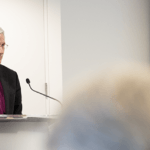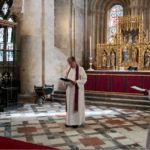COVID-19 A message from the Oxford bishops
Ad Clerum – March 2020
We are undoubtedly living through one of the greatest crises of our lives. The Archbishops announced yesterday that, following government advice, “public worship will have to stop for a season. Our usual pattern of Sunday services and other midweek gatherings must be put on hold”. The full text of the Archbishops letter is here, and other related advice is gathered here. This is continually updated.
Given the scale of the global pandemic, the risks to public health and the advice from government this is the only possible course of action. All of us will need to follow it.
However this will be painful and difficult news for the whole Church. In a time when our every instinct is to draw together in worship and fellowship, to comfort one another and reach out to others, we must remain physically distanced. Many will need to be isolated for their own protection or for the sake of their families.
We do not know how long this situation will endure but an initial time frame of at least three months seems likely and it may well be longer. It is all deeply painful.
We should expect that many people, including ourselves, will be in shock over the next few days at the speed of the escalation of the crisis, the economic difficulties, the changes to familiar patterns and the loss of familiar and deeply valued patterns of worship.
We all respond in different ways to shock and trauma and difficult news. Some are adjusting rapidly. Others will find it difficult to believe and take in. Some will be angry. Some will want to argue and bargain and find ways around the advice. Others will channel their energies into rebuilding hope and offering practical suggestions.
Clergy, chaplains, lay ministers and churchwardens will be on the front line in explaining the decisions and the new arrangements and helping and supporting others. This will not be easy. When we are in shock, we can only take in so much information at any one time. There is a danger of being overwhelmed.
Together we will need to continue to build up the Church, to help care for God’s world and to care for one another in the coming weeks and months. It won’t be possible to put new systems in place all at once. We will need patience with ourselves and others and great kindness in all our communication. But by the grace of God, we will continue to be a Christ-like Church for the sake of God’s world even in the midst of this most difficult of times.
You know us all to be set
in the midst of so many and great dangers,
that by reason of the frailty of our nature
we cannot always stand upright:
grant us such strength and protection
as may support us in all dangers
and carry us through all temptations;
through Jesus Christ our Lord.
You are not alone
One of the deep foundations of Christian faith is that it is not good for humankind to be alone. We are made for love and community by a God who is love. We place our faith and trust in God as three persons in one fellowship and communion: Father, Son and Holy Spirit.
The most important message we want to send to everyone in the Diocese and the wider community at this time of necessary distancing is that you are not alone. God is with us as we pray by ourselves and in families. There are many different ways in which we can connect with each other through technology. We will need to make full use of them and find new patterns of prayer, worship, pastoral care and fellowship for as long as it takes.
We may not be able to meet together in the normal way as congregations for a time, but we are bound together through the ministry of the word and the prayers, by our common baptism and by bonds of Christian love.
Our churches remain open; our faith in God is undiminished; public worship may be suspended, but the life of God’s kingdom is inextinguishable.
As bishops and senior staff we will be in regular contact with clergy, lay ministers and churchwardens by phone, email and by other means and we would value hearing from you about questions you are facing and ideas which are developing. We know already that many parishes and clergy are finding innovative ways forward and are ahead of us. Please share what you are learning, and we will pass it on.
Church House Oxford
Following Government advice, most staff will now be working from home for the foreseeable future. With very few exceptions, diocesan meetings and events will not be happening in person, and we will not be able to welcome visitors to Church House.
All face to face training is cancelled until further notice. However, in these extraordinary times we are seeking to continue to enable the mission and ministry of the Diocese in every way we can. Staff can still be contacted by email and phone in the normal way. The general approach will be that meetings will continue, but remotely, using Microsoft Teams or other suitable technology, and we will provide advice on accessing this as we all adjust to a new mode of delivery.
Schools and chaplaincies
This evening we have heard that schools across the UK will close to most pupils from Friday, and that exams will not take place. Grandparents have been warned not to look after children. Our prayers are with teachers, pupils and families as they take in this latest development.
Meanwhile, our chaplains in the health service, prisons, armed forces and education continue to serve in very demanding circumstances.
What can happen locally?
Public worship, as we have said, will have to stop for a season. Our usual pattern of Sunday services and other mid-week gatherings must be put on hold.
What then can still happen?
- Many of our Church buildings will remain open for private prayer with take away printed resources available, facilities to light candles, prayer requests and other aids.
- Clergy and lay ministers are encouraged to continue to offer prayer and worship in parish churches within the guidance given by the Archbishops’ letter both on Sundays and weekdays.
- This cannot be public worship that everyone can attend but an offering of prayer and praise for the nation and the world.
- Consider what you can do by way of live-streaming these services (helpful guidance here and more to follow)
- Encourage parishioners to join in with the National Day of Prayer on 22nd March.
Err on the side of caution in this initial period. If something feels as though it may be outside the spirit of the guidelines, it probably is. Area Deans and Archdeacons will be the first point of call for questions or to talk things through.
Use local discretion and decision making. Not everything has to be in place immediately. Not every local church will be open daily or have prayers said in it on Sundays. Do what can be done within the limited resources available.
What will be streamed for the whole Diocese?
Bishop Steven will preside at the Eucharist this Sunday and offer a brief reflection to the whole Diocese from Christ Church at 10 am. In keeping with the restrictions only a handful of people will be able to be present.
We are aiming to live stream this service. Details of how to connect will be circulated across the Diocese before the weekend.
Bishops Colin, Alan and Olivia will be offering reflections on our three local radio stations early on Sunday morning. These will be recorded and shared on the website.
On future Sundays we will offer at least one streamed service centrally, and we will make others known through the website weekly. We will ensure that the streamed services offered reflect the whole breadth of our Anglican tradition.
We are aiming to stream reflections and the principal services for Holy Week and Easter as we celebrate together in different ways the central, life-changing truths of Christian faith that Christ died for our sins and rose again.
Wider care in the community
We are already aware of wider initiatives in the community to care for those who are isolated and in great need. Clergy and congregations are often joining in, always working in partnership and sometimes acting as facilitators to draw people together. This is exactly the right approach. This is a time for all those who can to support our foodbanks, neighbourhood and pastoral schemes of all kinds.
Some headline practicalities and links
- For baptisms, weddings and funerals please see the national guidance pages which are being updated regularly, including funerals guidance published in the last hour (see FAQs). Careful liaison with undertakers and crematoria staff is essential for all funerals. We expect national guidance on banns and weddings before the end of the week.
- Confirmations due to take place in the next three months will be postponed and rearranged. We will keep confirmations for June to December in our diaries and keep parishes and deaneries informed as the national situation develops.
- Licensings and Collations/Institutions – will take place by arrangement with the attendance of the priest, Bishop, Archdeacon and appropriate representatives.
- The Chrism Mass and Renewal of Vows – this cannot be held in Christ Church as planned. We will offer a shortened streamed service with details to be announced. Please retain your oils from last year’s Chrism as it will not be possible safely to distribute new oils until restrictions end.
- The ordination of deacons – will be postponed from June. We will make provisional plans for ordination at Michaelmas (though we shall ensure that those due to be ordained deacon can start in the parish and be paid from July).
- The ordination of priests – will also be postponed and again we will make provisional plans for ordination at Michaelmas.
- APCMs – these will need to be postponed. National advice will be available in the next few days.
Future guidance
We will be updating this guidance regularly and also thinking through and circulating ideas and good practice in many different areas of Church life over the coming weeks. We recognise that the changing advice has been challenging for everyone over recent days. We are working as quickly as we can to offer practical support.
One resource we have already become aware of is helpful guidance on the traditional practice of Spiritual Communion when it is not possible to receive the sacrament because of sickness or other need. The details are here.
Watching over yourself
As clergy, ministers and wardens, we have a clear Christian duty to watch over ourselves as well as to watch over the Church of God. This means taking care of our own physical and emotional health, especially when ministry will be more demanding. It will mean supporting and encouraging one another, and we will offer more on how best to do this within deaneries and archdeaconries in the coming week.
Those over 70 and those whose health is vulnerable should follow government guidance and self-isolate or be shielded following medical advice. We do realise it is not easy stepping back from a vocation to minister and serve others, but following government health guidance is essential. Those who have the relevant symptoms should observe the 14-day household quarantine restriction. Please make sure you let your Vicar know (for lay ministers and wardens), and your Area Dean and Archdeacon know (for clergy).
We do not live by bread alone
The local church is a vital part of every community in this Diocese. Clergy and chaplains, lay ministers and churchwardens are a front line service for the well-being of society, both during this crisis and in the rebuilding which will follow. Much of our prayer and work over the coming weeks will be hidden from public view. As Jesus says over and over again in the Sermon on the Mount, God sees what is done in secret. This is often the most valuable part of our ministry.
We will continue to be in regular contact. Area Deans and Archdeacons will continue to be the first line of contact for practical questions and please do not hesitate to be in touch with us as bishops on personal and pastoral matters,
Thanks be to God for our fellowship and for all you offer in ministry
With our love and prayers,






